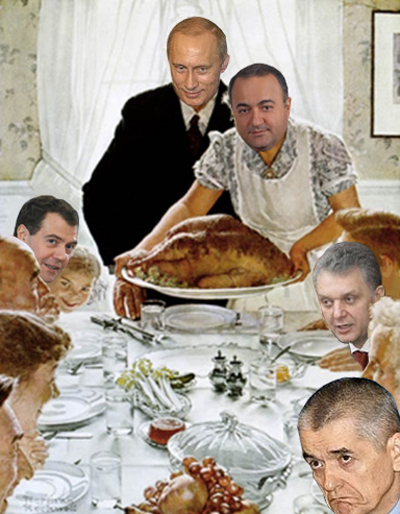
By John Helmer, Moscow
Russian poultry producers hope to reduce next year’s poultry import quota to as little as 300,000 tonnes, with just 50,000 tonnes of US chicken legs for direct consumption. Before too long, the domestic growers are also hoping to start exporting Russian poultry abroad.
In 2009, the US shipped 733,000 tonnes of poultry to Russia, and the quota for 2010 — interrupted by a dispute over chlorine residues for the first half of the year — has been 600,000 tonnes. This year, according to Musheg Mamikonyan, head of the Russian Meat Producers Association, local poultry production grew by 13%, and it is expected to grow another 10% next year.
Mamikonyan told Fairplay that for next year, “I believe that the 350,000 to 400,000 tonnes of imported poultry meat is optimal if it is broken down the following way: 70,000-100,000 tonnes imported for mechanical treatment; another 30,000-50,000 tonnes, namely chicken filets, breasts and turkey thighs, are used for deep processing; another 50,000 tonnes, namely average quality whole chicken legs from the US, are used for cooking by small businesses; and finally 150,000 to 200,000 tonnes for industrial processing. Next year Russia plans to produce around 3 million tonnes of poultry meat, and it will be optimal to keep the import level at around 10% of that volume.”
The Russian meat lobby is dominated by large production companies like Cherkizovo of Moscow; Mamikonyan worked in management for Cherkizovo in the 1990s, and he is a member of its board of directors at present. Cherkiizovo is flatly opposed to the attempt by the Russian food product safety inspector, Gennady Onishchenko, to ban all frozen chicken imports next year, but the company and the meat producers association do not dare to attack Onishchenko’s competence, or his source of patronage, directly. “All production chains that process poultry use frozen meat, and a total ban on frozen poultry imports would be very stressful for these meat processing companies,” Mamikonyan told Fairplay today.
An independent analyst of the Russian industry, Tigran Hovhannisyan of Uralsib Bank, points out that Cherkizovo is both a big producer of poultry and also a big processor. “It needs cheap imported frozen meat for processing”, he notes.
Critics of Onishchenko in the Russian food industry believe that he always acts on food safety and trade issues when there is a clear client giving him his lead. “Onishchenko never does anything without lifting his finger to test which way the wind is blowing,” said one source. “He has his clients, certainly. Somethimes they are the government itself. He also has his future career prospects in mind,” said another source from the foreign meat trade.
According to Hohannisyan, Onishchenko’s attempt to impose a total ban on next year’s imported frozen poultry imports is a move designed by the government to balance the needs of small Russian poultry producers with the political imperative that meat prices should not rise during next year’s parliamentary and presidential election campaigns.
“Grain prices have been going up, and feedgrain for poultry producers may rise even faster,” Hovannisyan notes. “If that turns into rising domestic poultry prices, that will trigger government concern at rising meat prices during the election campaigns. On the other hand, imports of frozen poultry will help bring consumption prices down, but hurt the smaller domestic producers. Cheap meat is a temporary political expedient. The government is trying to balance the two factors.”
Russia could become self-sufficient in poultry and pork before 2013, Cherkizovo has been forecasting. The Russian government has been claiming this year that within ten years the farm sector should aim to export up to $2 billion worth of poultry and pork.
Note: the Russians who have taken over Norman Rockwell’s portrait of the traditional American Thanksgiving feast are (clockwise from left to right): Dmitry Medvedev, Vladimir Putin, Musheg Mamikonyan, Victor Khristenko (Industry and Trade Minister), and at bottom right, Gennady Onishchenko.











Leave a Reply